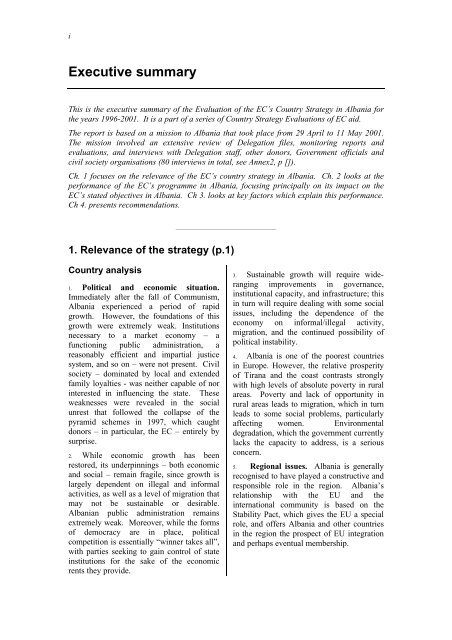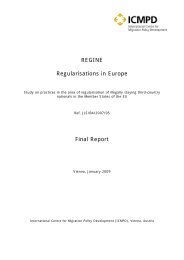Final Report - European Commission - Europa
Final Report - European Commission - Europa
Final Report - European Commission - Europa
Create successful ePaper yourself
Turn your PDF publications into a flip-book with our unique Google optimized e-Paper software.
i<br />
Executive summary<br />
This is the executive summary of the Evaluation of the EC’s Country Strategy in Albania for<br />
the years 1996-2001. It is a part of a series of Country Strategy Evaluations of EC aid.<br />
The report is based on a mission to Albania that took place from 29 April to 11 May 2001.<br />
The mission involved an extensive review of Delegation files, monitoring reports and<br />
evaluations, and interviews with Delegation staff, other donors, Government officials and<br />
civil society organisations (80 interviews in total, see Annex2, p []).<br />
Ch. 1 focuses on the relevance of the EC’s country strategy in Albania. Ch. 2 looks at the<br />
performance of the EC’s programme in Albania, focusing principally on its impact on the<br />
EC’s stated objectives in Albania. Ch 3. looks at key factors which explain this performance.<br />
Ch 4. presents recommendations.<br />
____________________________________________<br />
1. Relevance of the strategy (p.1)<br />
Country analysis<br />
1. Political and economic situation.<br />
Immediately after the fall of Communism,<br />
Albania experienced a period of rapid<br />
growth. However, the foundations of this<br />
growth were extremely weak. Institutions<br />
necessary to a market economy – a<br />
functioning public administration, a<br />
reasonably efficient and impartial justice<br />
system, and so on – were not present. Civil<br />
society – dominated by local and extended<br />
family loyalties - was neither capable of nor<br />
interested in influencing the state. These<br />
weaknesses were revealed in the social<br />
unrest that followed the collapse of the<br />
pyramid schemes in 1997, which caught<br />
donors – in particular, the EC – entirely by<br />
surprise.<br />
2. While economic growth has been<br />
restored, its underpinnings – both economic<br />
and social – remain fragile, since growth is<br />
largely dependent on illegal and informal<br />
activities, as well as a level of migration that<br />
may not be sustainable or desirable.<br />
Albanian public administration remains<br />
extremely weak. Moreover, while the forms<br />
of democracy are in place, political<br />
competition is essentially “winner takes all”,<br />
with parties seeking to gain control of state<br />
institutions for the sake of the economic<br />
rents they provide.<br />
3. Sustainable growth will require wideranging<br />
improvements in governance,<br />
institutional capacity, and infrastructure; this<br />
in turn will require dealing with some social<br />
issues, including the dependence of the<br />
economy on informal/illegal activity,<br />
migration, and the continued possibility of<br />
political instability.<br />
4. Albania is one of the poorest countries<br />
in Europe. However, the relative prosperity<br />
of Tirana and the coast contrasts strongly<br />
with high levels of absolute poverty in rural<br />
areas. Poverty and lack of opportunity in<br />
rural areas leads to migration, which in turn<br />
leads to some social problems, particularly<br />
affecting women. Environmental<br />
degradation, which the government currently<br />
lacks the capacity to address, is a serious<br />
concern.<br />
5. Regional issues. Albania is generally<br />
recognised to have played a constructive and<br />
responsible role in the region. Albania’s<br />
relationship with the EU and the<br />
international community is based on the<br />
Stability Pact, which gives the EU a special<br />
role, and offers Albania and other countries<br />
in the region the prospect of EU integration<br />
and perhaps eventual membership.
















